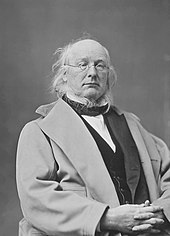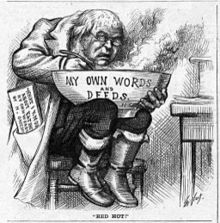Horace Greeley 1872 presidential campaign
| Horace Greeley for President | |
|---|---|
Benjamin Gratz Brown | |
| Affiliation | Liberal Republican |
| Status | Lost general election |
In 1872,
His hypothetical victory would have marked the first socialist presidency, alongside having held no prior office.
The Liberal Republican nomination fight


The fight for the presidential nomination of the
The Greeley nomination was extremely surprising to U.S. Senator
A group of Democrats dissatisfied with the Greeley nomination called themselves the Straight-Out Democratic Party and held a second nominating convention in Louisville, Kentucky. They nominated Charles O'Conor and John Quincy Adams II as candidates. They received 0.35% of the popular vote and no Electoral College votes.
Campaign
The 1872 U.S. presidential campaign was filled with dirty attacks and mudslinging on both sides, with Greeley partisans calling Grant a dictator and a drunk, while Grant partisans called Greeley a traitor and a flake.
While President Grant did not actively campaign, Greeley travelled through New Jersey, Pennsylvania, Ohio, Kentucky, and Indiana and delivering up to 22 speeches per day for a total of nearly 200. Ultimately, though, Greeley was hurt by the belief that he was saying the wrong things to the wrong audiences during his campaign, and by taking political attacks extremely personally. He also suffered a personal loss during the campaign when his wife fell ill and died in October 1872.[3][4][5]
To make matters worse, his running mate, Gratz Brown, was an embarrassment who attended campaign events and delivered speeches while intoxicated (he fainted before a gathering in New York City, and at a campaign picnic, Brown was so drunk he was seen slicing up and buttering a watermelon), forgot party policies, and generally made errors and misstatements.[3]
Results
Grant defeated Greeley in the election by a landslide, winning 31 out of 37 states[5] in capturing the Electoral College by 286 to 66,[6] and won the national popular vote by 55.6% to 43.8%. Grant's winning percentage was the highest between 1828 and 1904, while Greeley's losing percentage was the lowest between 1848 and 1904. However, Grant's performance was much weaker in the South, where his (and the Republicans') appeal was primarily limited to Black men.[3]
Due to exhaustion and demoralization, Horace Greeley himself died several weeks after the 1872 election, before the Electoral College met.[2][3][7]
References
- ^ a b c d "HarpWeek | Elections | 1872 Overview". Elections.harpweek.com. Retrieved 2017-09-21.
- ^ a b "GREELEY, Horace – Biographical Information". Bioguide.congress.gov. Retrieved 2017-09-21.
- ^ a b c d e f g "HarpWeek | Elections | 1872 Overview". Elections.harpweek.com. Retrieved 2017-09-21.
- ^ a b "Greeley, Horace (1811–1872) | The Vault at Pfaff's". Pfaffs.web.lehigh.edu. Retrieved 2017-09-21.
- ^ a b c "Horace Greeley". Uudb.org. 2006-03-04. Retrieved 2017-09-21.
- ^ Grant also won Arkansas and Louisiana, but their 14 electoral votes were rejected due to various irregularities and allegations of electoral fraud.
- ^ "The Death of Horace Greeley". The Nation. 2009-07-08. Retrieved 2017-09-21.
